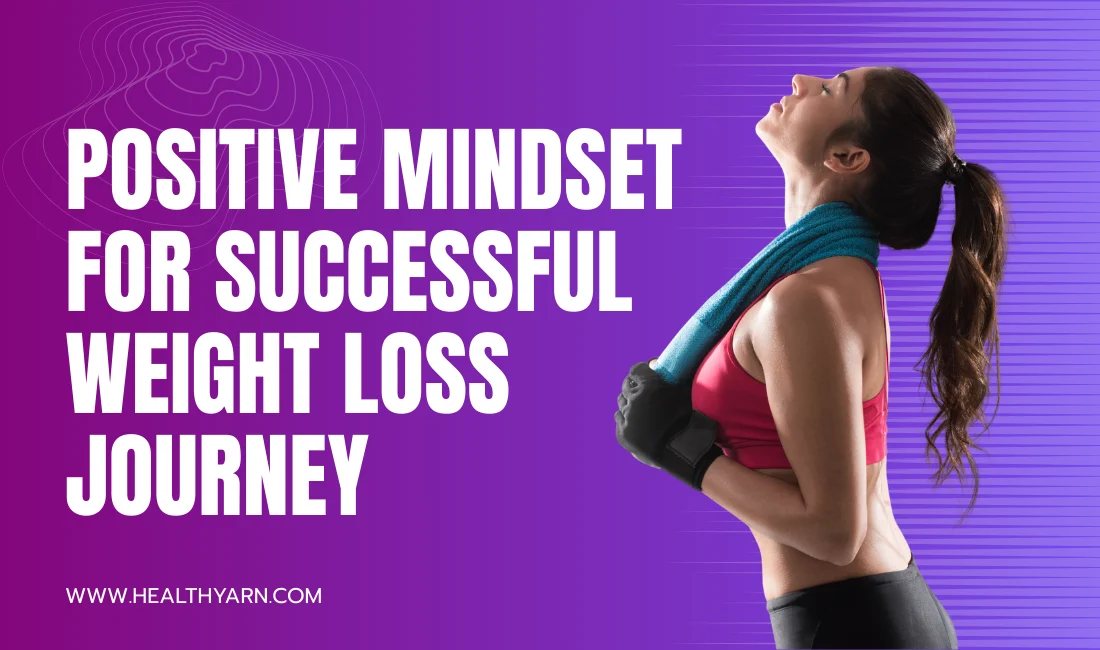Introduction to Positive Mindset for Successful Weight Loss Journey
In the pursuit of weight loss, many people focus solely on external factors such as diet and exercise, neglecting the crucial role of mindset. However, cultivating a positive mindset can significantly impact your weight loss journey and pave the way for long-term success. In this article, we will delve into the importance of a positive mindset, exploring the mind-body connection, shifting your mindset, overcoming mental barriers, adopting a growth mindset, building a supportive environment, enhancing self-image and body positivity, mindful eating, the power of positive habits, overcoming emotional eating, and concluding with a recap of key points and encouragement to embrace a positive mindset for successful weight loss.
Understanding the Mind-Body Connection
A. The Impact of Thoughts and Emotions on Weight Loss
Weight loss is not just a physical endeavor; it is deeply intertwined with our thoughts and emotions. Negative thoughts and emotions can hinder our progress, leading to self-doubt, demotivation, and a lack of consistency. On the other hand, a positive mindset can empower us to overcome challenges, stay motivated, and make sustainable changes.
B. Exploring the Mind-Body Connection
The mind-body connection refers to the intricate relationship between our mental and physical well-being. Our thoughts, beliefs, and emotions can influence our physiological responses, including metabolism, hormonal balance, and even cravings. By understanding and harnessing this connection, we can optimize our weight loss efforts.
- How Negative Thoughts Can Hinder Weight Loss Progress
Negative thoughts, such as self-criticism and doubt, can create a self-sabotaging cycle. They can lead to emotional eating, lack of motivation, and inconsistency in healthy behaviors. By recognizing and challenging these negative thoughts, we can break free from their grip and create a more positive mindset.
- Cultivating a Positive Mindset for Better Outcomes
Cultivating a positive mindset involves consciously choosing empowering thoughts and beliefs. By focusing on self-compassion, self-acceptance, and self-belief, we can create a nurturing environment for weight loss success. Positive affirmations, visualization techniques, and creating a vision board can further strengthen our commitment and motivation.
Shifting Your Mindset: Building Motivation
A. Identifying Personal Motivations for Weight Loss
Motivation is the driving force behind any successful weight loss journey. By identifying your personal motivations, whether it’s improving health, boosting self-confidence, or setting a positive example for loved ones, you can tap into a deep well of determination and resilience.
B. Setting Realistic Goals and Expectations
Setting realistic goals and expectations is crucial for maintaining motivation and avoiding disappointment. Instead of fixating solely on weight loss numbers, focus on non-scale victories, such as increased energy levels, improved sleep, and enhanced overall well-being. Celebrating these milestones will keep you motivated and engaged.
C. Utilizing Positive Affirmations for Self-Motivation
Positive affirmations are powerful tools for self-motivation. By repeating positive statements about your capabilities and potential, you can rewire your subconscious mind, replacing self-doubt with self-assurance. Incorporate affirmations into your daily routine to strengthen your belief in yourself and your weight loss journey.
D. Visualizing Success and Creating a Vision Board
Visualization is a technique that athletes and successful individuals have used for years to achieve their goals. By vividly imagining yourself reaching your desired weight and embodying the lifestyle you desire, you can reinforce your motivation and create a roadmap for success. Creating a vision board with images and words that represent your goals can serve as a daily reminder of what you’re working towards.
Overcoming Mental Barriers
A. Addressing Self-Doubt and Limiting Beliefs
Self-doubt and limiting beliefs can derail even the most well-intentioned weight loss efforts. Recognize and challenge these beliefs by reframing negative thoughts, seeking support from loved ones, and focusing on your past achievements. Replace “I can’t” with “I can” and watch how your mindset transforms.
B. Breaking Free from the Dieting Mindset
The dieting mindset often perpetuates a cycle of restriction and deprivation, leading to frustration and unsustainable outcomes. Instead, embrace a lifestyle approach to weight loss, focusing on nourishing your body with whole, nutritious foods and finding joy in physical activity. This shift in mindset allows for a sustainable, long-term transformation.
C. Cultivating Self-Compassion and Practicing Self-Care
Self-compassion and self-care are integral to maintaining a positive mindset. Treat yourself with kindness and understanding, recognizing that setbacks are part of the journey. Prioritize activities that nourish your soul, whether it’s practicing mindfulness, taking a relaxing bath, or engaging in hobbies you enjoy.
D. Dealing with Setbacks and Staying Motivated
Setbacks are inevitable, but they don’t define your journey. Learn from them, adjust your approach if necessary, and use setbacks as opportunities for growth. Surround yourself with a support system that understands and encourages your efforts, and seek professional help when needed to navigate any challenges.
Role of Adopting a Growth Mindset in Positive Mindset for Successful Weight Loss
A. Embracing Challenges and Learning from Failures
A growth mindset views challenges and failures as opportunities for growth and learning. Embrace setbacks as valuable lessons and adjust your approach accordingly. Celebrate your progress, however small, and keep striving for improvement. With a growth mindset, your weight loss journey becomes a continuous process of self-discovery and personal development.
B. Developing Resilience and Perseverance
Resilience and perseverance are essential qualities on the path to weight loss success. Understand that progress may not always be linear, and setbacks are temporary roadblocks. Cultivate resilience by focusing on your strengths, seeking support, and maintaining a positive outlook even in the face of adversity.
C. Seeking Opportunities for Personal Growth and Learning
Weight loss is not just about shedding pounds; it is an opportunity for personal growth and transformation. Embrace new experiences, explore different types of physical activity, and expand your knowledge about nutrition and healthy habits. The more you learn and grow, the more empowered you become on your weight loss journey.
D. Reframing Setbacks as Learning Experiences
Rather than viewing setbacks as failures, reframe them as valuable learning experiences. Analyze what went wrong, identify areas for improvement, and adjust your approach accordingly. By reframing setbacks, you shift your mindset from defeat to progress, accelerating your path to success.
Building a Supportive Environment
A. Surrounding Yourself with Positive Influences
Your environment plays a significant role in shaping your mindset and behaviors. Surround yourself with positive influences, whether it’s supportive friends, family members who share your goals, or online communities dedicated to healthy living. Minimize exposure to negativity and seek out uplifting and inspiring individuals.
B. Communicating with Friends and Family about Your Goals
Openly communicate your weight loss goals with your friends and family. Explain why it is essential to you and how their support can contribute to your success. Sharing your journey with loved ones not only holds you accountable but also creates a network of support and encouragement.
C. Joining Support Groups or Finding an Accountability Partner
Support groups and accountability partners can provide a sense of belonging and motivation. Join local or online weight loss support groups, where you can share experiences, seek advice, and celebrate milestones together. Alternatively, find an accountability partner who shares your goals and can help you stay on track.
D. Seeking Professional Help When Needed
There may be times when professional help is necessary to address specific challenges or underlying issues. Don’t hesitate to reach out to healthcare professionals, such as registered dietitians, therapists, or personal trainers, who can provide expert guidance tailored to your needs. Remember, seeking help is a sign of strength and commitment to your well-being.
Enhancing Self-Image and Body Positivity
A. Embracing Body Positivity and Self-Acceptance
Body positivity involves accepting and appreciating your body at every stage of your weight loss journey. Instead of focusing solely on appearance, celebrate your body’s strength, resilience, and functionality. Practice self-love and reject societal ideals that promote unrealistic beauty standards.
B. Focusing on Non-Scale Victories and Other Measures of Success
Weight loss is not solely determined by numbers on a scale. Shift your focus to non-scale victories, such as increased energy levels, improved fitness, enhanced mood, and better overall health. Celebrating these achievements reinforces a positive mindset and helps maintain motivation.
C. Practicing Positive Self-Talk and Body-Affirming Habits
Challenge negative self-talk and replace it with positive affirmations. Practice self-compassion, acknowledge your efforts, and celebrate your progress. Engage in body-affirming habits, such as wearing clothes that make you feel confident and participating in activities that promote body appreciation.
D. Cultivating a Healthy Relationship with Food and Exercise
Developing a healthy relationship with food and exercise is fundamental for sustainable weight loss. Rather than viewing them as punishment or reward, approach them as tools to nourish your body and enhance your well-being. Listen to your body’s cues, honor your hunger and fullness, and engage in physical activity that brings you joy.
How Mindful Eating Helps in Positive Mindset for Successful Weight Loss
A. Understanding the Concept of Mindful Eating
Mindful eating involves paying attention to the present moment while eating, focusing on the sensory experience and cues of hunger and fullness. By practicing mindful eating, you can develop a healthier relationship with food, make conscious choices, and prevent overeating.
B. Recognizing Hunger and Fullness Cues
Learn to listen to your body’s hunger and fullness cues. Eat when you’re physically hungry and stop when you’re comfortably full. Avoid distractions during meals, such as television or electronic devices, to stay present and attuned to your body’s needs.
C. Practicing Portion Control and Mindful Food Choices
Practice portion control by using smaller plates, bowls, and utensils. Be mindful of the quality and composition of your meals, opting for whole, nutrient-dense foods. Slow down and savor each bite, paying attention to flavors, textures, and the satisfaction they bring.
D. Mindful Eating Strategies for Social Situations
Navigating social situations can be challenging when it comes to mindful eating. Prepare ahead by planning your choices, setting boundaries, and practicing assertiveness in declining foods that don’t align with your goals. Focus on the social aspect of gatherings rather than solely on the food.
The Power of Positive Habits for Positive Mindset for Successful Weight Loss
A. Creating Healthy Routines and Rituals
Positive habits form the foundation of a successful weight loss journey. Create healthy routines and rituals that support your goals, such as meal prepping, regular exercise sessions, and dedicated self-care practices. Consistency is key in transforming these behaviors into long-lasting habits.
B. Incorporating Regular Physical Activity into Daily Life
Physical activity is essential for weight loss and overall well-being. Find activities you enjoy and make them a regular part of your day. Incorporate movement into your daily routine, whether it’s taking the stairs, going for a walk during breaks, or engaging in structured workouts.
C. Prioritizing Sleep and Stress Management for Weight Loss Success
Adequate sleep and effective stress management are often overlooked but vital components of weight loss success. Prioritize quality sleep by establishing a consistent sleep schedule and creating a relaxing bedtime routine. Implement stress-reducing techniques, such as meditation, deep breathing exercises, or engaging in hobbies that bring you joy.
D. Adopting a Positive Morning and Evening Routine
Start and end your day with positive habits that set the tone for success. Begin the morning with activities that uplift and energize you, such as meditation, journaling, or affirmations. Create an evening routine that promotes relaxation and prepares your mind and body for restful sleep.
Overcoming Emotional Eating
A. Identifying Emotional Triggers for Overeating
Emotional eating is a common challenge on the weight loss journey. Identify your emotional triggers, such as stress, boredom, or loneliness, and develop strategies to address them without turning to food. Seek alternative coping mechanisms that nurture your emotional well-being, such as practicing mindfulness, engaging in creative outlets, or seeking support from friends and loved ones.
B. Developing Alternative Coping Mechanisms
Discover healthy alternatives to cope with emotions instead of turning to food. Engage in activities that provide comfort and release stress, such as taking a walk in nature, listening to music, practicing yoga, or talking to a trusted friend. Experiment with various techniques to find what works best for you.
C. Mindful Techniques to Manage Emotional Eating
Practice mindfulness when it comes to emotional eating. Before reaching for food, pause and check in with yourself. Ask if you’re truly hungry or if there’s an emotional need that requires attention. Engage in mindful breathing exercises to calm your mind and make a conscious choice about how to address your emotions.
D. Seeking Professional Help for Emotional Eating Disorders
If emotional eating becomes chronic and uncontrollable, it may be a sign of an emotional eating disorder. Don’t hesitate to seek professional help from therapists or counselors specialized in eating disorders. They can provide the necessary guidance and support to help you overcome these challenges.
Conclusion
In conclusion, a nice attitude is a powerful device for a hit weight loss. By understanding the mind-body connection, transferring your mindset, overcoming intellectual obstacles, adopting a boom mind-set, building a supportive surroundings, enhancing self-image and frame positivity, working towards mindful ingesting, embracing superb behavior, and addressing emotional eating, you may release your inner capability and reap lasting results. Remember, your journey is precise, and development is made one step at a time. Embrace the energy of a advantageous attitude and let it manual you towards a more fit, happier you.









